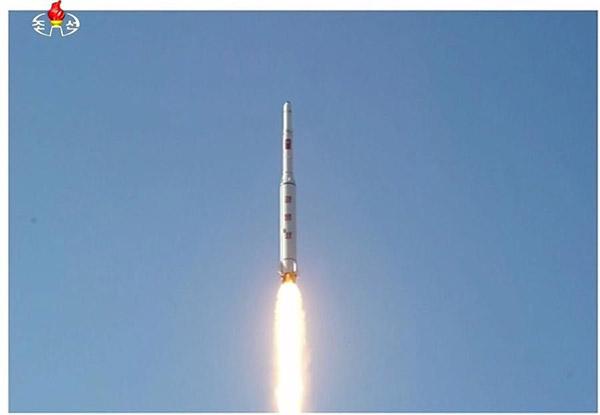 |
|
Democratic People's Republic of Korea launches a long range rocket launched into the air in this file still image taken from KRT video footage, released by Yonhap on February 7, 2016. [Photo/Agencies] |
The nuclear test conducted by the Democratic People's Republic of Korea on Friday was its fifth and largest, with a yield equivalent to about 10 kilotons of TNT, or trinitrotoluene. And it was its second this year.
This ill-considered move must be opposed, and that is exactly what China and the Republic of Korea did immediately after the nuclear test, because if it is not taken seriously, the DPRK may conduct more such tests.
Since the DPRK's nuclear program development program is still in the initial stages, it will have to carry out more tests to collect relevant data to build a nuclear warhead. But judging by its recent missile tests and assertive response to the international community's call for denuclearization of the Korean Peninsula, Pyongyang had signaled that it was planning something big. Take for example the timing. By conducting the latest nuclear test on the 68th anniversary of its founding, the DPRK intends to add "legitimacy" to its nuclear ambitions.
The test also comes as a time when China is at odds with the United States and the Republic of Korea after the latter two agreed to deploy the Terminal High Altitude Area Defense system in the ROK. That US President Barack Obama is set to leave office in four months and the country is caught in the presidential election frenzy might also have emboldened the DPRK to conduct the nuclear test now.
But whether the DPRK has become a nuclear power remains to be seen, because all its five nuclear tests have been small-scale detonations, and despite its self-proclamations, the international community is not going to recognize it as a nuclear state.
To some extent, the almost confirmed deployment of THAAD in the ROK has a lot to do with the DPRK's increasingly provocative posture, including the latest nuclear test, and could cause more damage to the Korean Peninsula. In response to the news of THAAD's deployment, Pyongyang has repeatedly pledged to take actions to preempt possible attacks from the US and the ROK. Which means Pyongyang may also expedite its nuclear program and test ballistic missiles more frequently, heightening the risk of war in the region.
On the other end of the vicious circle, Washington may seek to consolidate its presence on the Korean Peninsula and speed up THAAD's deployment. Should that happen, Pyongyang could face harsher sanctions, even military strikes. So the only cure for the DPRK's security dilemma lies in abandoning its nuclear program for good.
As for the ROK, what can best protect its national security is the thawing of diplomatic relationship with the DPRK, not THAAD or a closer military alliance with the US. Seoul should ease the sanctions it has imposed on Pyongyang and seek bilateral dialogue. Calling an end to the US-ROK joint drill, for instance, could help alleviate the DPRK's security concerns.
That the DPRK is still serious about its nuclear-first strategy indicates the military pressures and economic sanctions imposed on it have failed to work. So the US needs to forgo its Cold-War mentality and stop seeing the DPRK as a permanent adversary if it truly wants to help maintain regional order.
Fixing its diplomatic ties with Pyongyang, working on a proper alternative to the 1953 armistice, and contributing to the resumption of the Six-Party Talks should be a good start for Washington. But that requires long-term planning and patience.
China, on its part, will strictly abide by the UN Security Council's sanctions on the DPRK and urge it to stop making all the wrong steps.
The author is an associate researcher at the Center for Northeast Asian Studies in Jilin province.